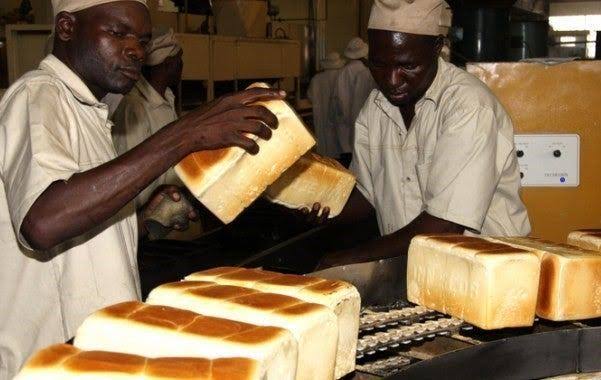News
Faction opts out as bakers begin strike Tuesday

By Francesca Hangeior
A group of bakers in the country, on Monday, kicked against the nationwide strike declared by some of their counterparts, starting on Tuesday.
The Association of Master Bakers and Caterers of Nigeria announced on February 14 that it is poised to begin a nationwide strike on February 27 unless the Federal Government honours the agreement made with the association in 2020.
It also called for the temporary suspension of all types of taxation on the bakery industry at the federal, state, and local government levels.
In a statement announcing the strike, the National President of AMBCON, Mansur Umar, said, “The Association of Master Bakers and Caterers of Nigeria have critically accessed the state of our business operation, consequently demand the liberalisation of flour and sugar importation, reduction or total removal of import duties on major baking materials such as flour, sugar, butter, yeast, etc as applicable to other commodities as have recently been done by the Federal Government and provision of concessionary forex exchange to flour millers and other stakeholders as well as reduction of tariff on imported wheat and sugar.”
The association also called for the setting up of a price control and monitoring committee as allowed by the constitution as amended and other conditions that will enhance the ease of doing business in the country.
However, in a statement on Monday, some bakers under the umbrella of Supreme Bakers and Confectioners Association of Nigeria said embarking on strike at a time Nigerians are going through a lot is uncalled for and could exacerbate the situation.
The association’s acting National President, Edmund Egbuji, urged all members of the group not to participate in the strike.
The statement read, “The BOT chairman and the entire members of the board of trustees in conjunction with the national exco of Supreme Bakers and Confectioners Association of Nigeria wish to bring to the notice of the general public that Supreme Bakers Association will not embark on a nationwide withdrawal of services (strike) proposed by some bakers association in the country.
“Supreme bakers deem it as unpatriotic at this time of food insecurity and scarcity in the country. Going on strike will never be an option rather the government through its relevant ministries should call for a roundtable discussion to cushion the effects of food scarcity plight.
“All members of the supreme bakers are hereby directed to go about the business of feeding the nation as any contrary action will add to the pains of the overstretched citizens.”
News
Eurocham Nigeria Hosts 2025 Stakeholders Conference, Explores Business Growth in Post-Reform Era

By Gloria Ikibah
Business leaders, policymakers, and members of the diplomatic community recently gathered in Lagos for the 2025 annual stakeholder conference of Eurocham Nigeria (The European Business Chamber) to discuss the impact of Nigeria’s economic reforms on trade, investment, and sustainable growth.
With the theme “Achieving Growth Post-Reforms,” the conference provided a platform to explore opportunities across key sectors, including trade, aviation, tourism, energy, finance, and workforce transformation.
In his welcome address, Eurocham Nigeria President, Mr. Yann Gilbert, emphasized the organization’s role in championing policies that foster economic progress and strengthen EU-Nigeria business ties.
Delivering a keynote speech, Honorary President of Eurocham Nigeria and European Union Ambassador to Nigeria and ECOWAS, Mr. Gautier Mignot, reaffirmed the EU’s dedication to Nigeria’s economic transformation. He outlined initiatives aimed at deepening trade relations and unlocking investment potential, introducing the EU-Eurocham Support Grant as a mechanism to boost private-sector growth.
In a second keynote address, Minister of Aviation and Aerospace Development, Festus Keyamo (SAN) who was represented by the Special Adviser on Aviation and Aerospace Development, Ms. Janet Oputa, highlighted the aviation sector’s role in post-reform economic expansion. Speaking on “Aviation: A Catalyst for Growth,” she detailed ongoing infrastructure projects and emerging investment opportunities in Nigeria’s air transport industry.
A key feature of the event was a presentation by Ms. Danelee Masia, Director Economist for South Africa and Sub-Saharan Africa at Deutsche Bank, titled “Nigeria: A Path to Renewed Growth.” She provided a macroeconomic analysis of Nigeria’s recovery, focusing on fiscal reforms, foreign exchange policies, and investment trends shaping the nation’s future.
Eurocham Nigeria reaffirmed its commitment to strengthening partnerships between Nigeria and the European business community. The organization pledged continued advocacy for pro-business policies, regulatory enhancements, and economic cooperation initiatives that benefit both Nigeria and the EU.
News
TAC Reaffirms Commitment to Enhancing Nigeria’s Global Image

By Gloria Ikibah
The Director General, Technical Aid Corps (TAC), Rt. Hon. Yusuf Buba Yakub, has reaffirmed the Corps’ dedication to strengthening Nigeria’s reputation on the international stage.
The Director-General stated this during a courtesy visit by a delegation from the Diplomatic Correspondents Association of Nigeria (DICAN), led by its Chairman, Comrade Frederick Idehai, on Monday in Abuja
Buba highlighted the role of TAC in promoting Nigeria’s influence abroad by deploying technical expertise to 35 African, Caribbean, and Pacific countries, and noted that the Corps has contributed to the professional growth of individuals who have gone on to hold key government positions, including cabinet ministers, while also impacting millions of lives.
Additionally, he assured DICAN of TAC’s readiness to collaborate in advancing the 4Ds foreign policy of President Bola Ahmed Tinubu’s administration. This policy anchored on Democracy, Development, Demography, and Diaspora was introduced by the Ministry of Foreign Affairs under Minister Ambassador Yusuf Maitama Tuggar., which aims to position Nigeria strategically within the global community.
He further emphasised TAC’s commitment to working closely with DICAN, ensuring that the association is actively involved in the Corps’ activities through mutual collaboration and support.
Earlier in his remarks, DICAN Chairman, Comrade Idehai, expressed the association’s interest in partnering with TAC to promote its initiatives in alignment with the 4Ds doctrine. He underscored the strategic role of diplomatic correspondents in fostering national development and stability.
Comrade Idehai also highlighted DICAN’s mandate as a professional body of journalists and editors from print, electronic, online, and wire services, who cover diplomatic affairs, including the Ministry of Foreign Affairs, embassies, and international organizations.
He explained that the association was duly registered with the Corporate Affairs Commission (CAC) making it a credible partner for engagement.
News
Kenya Airways apologises to NCAA for mistreating passenger

Kenya Airways officials have tendered an unreserved apology to the Nigeria Civil Aviation Authority (NCAA) and a Nigerian passenger: Gloria Omisore, following a complaint of mistreatment during a recent flight.
The airline also retracted previous statements regarding the incident, admitting fault for allowing Omisore to board a flight from Lagos without the necessary transit visa.
The apology came during a meeting convened by the NCAA attended by airline representatives including Country Manager James Nganga, Station Manager Eric Mukira, and Duty Manager Ezenwa Ehumadu, alongside NCAA Director of Consumer Protection and Public Affairs, Michael Achimugu.
Omisore, a British resident permit holder without a Schengen visa, had purchased a ticket for a Manchester-Paris-Nairobi-Lagos (inbound) and Lagos-Nairobi-Paris-Manchester route.
While her inbound journey proceeded without issue, the airline failed to identify the need for a Paris transit visa for her outbound leg until she reached Nairobi.
Although Kenya Airways offered a direct flight to London at no extra cost after a 17-hour layover, the situation escalated when Omisore’s request for accommodation and care due to the airline’s error was denied, leading to what the NCAA termed an “unruly” exchange.
In a prior statement, Kenya Airways claimed Omisore refused the re-routing and acted disruptively. They have since retracted this, admitting their error and apologizing for the “obfuscation of facts.”
The NCAA had given Kenya Airways 48 hours to verify a phone call made by Omisore on December 7, 2025, where she reportedly inquired about her eligibility to fly the route.
The authority also expressed strong disapproval of comments made by airline staff allegedly insulting the office of the Nigerian President, stating the airline could not act with impunity towards Nigerians.
The country manager apologized for the staff’s behavior, promising disciplinary action.
The NCAA has reiterated its call for all airlines operating in Nigeria to adhere to regulations and establish dedicated, trained customer relations desks or officers to handle such issues.
-

 News21 hours ago
News21 hours agoUK faces labour scarcity, introduces new visa programs to attract international talent
-

 News21 hours ago
News21 hours agoTrump employs Musk as ‘special employee’ without salary
-

 Entertainment21 hours ago
Entertainment21 hours agoTinubu Hails Tems On Grammy Award, Applauds Other Nigerian Artists
-

 News11 hours ago
News11 hours agoSEE list of States that will experience delayed rainfall in 2025
-

 News14 hours ago
News14 hours agoHunger forced me to sell my son N1.5m, mother tells police
-

 News20 hours ago
News20 hours agoHuman trafficking: Court slams 5 years jail term on Benedicta Usen
-

 Entertainment14 hours ago
Entertainment14 hours agoI Do Both Ways!” – Denrele Edun Opens Up On His Sexuality
-

 News18 hours ago
News18 hours agoHouse Pays Tribute to Late Deputy Whip, Onanuga, Adjourns Plenary








